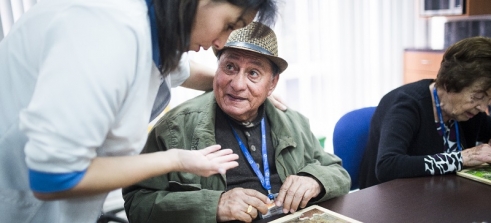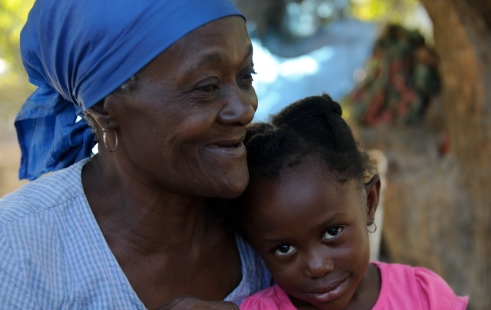By Ben Small
Today (30 September), the World Health Organization (WHO) has launched its World Report on Ageing and Health, a publication that brings a welcome shift in focus on health in older age.
Against the backdrop rapid population ageing, the report highlights the major challenges all countries face in ensuring the health and wellbeing of their older members of society.
The world’s ageing population and its challenges
By 2050, the proportion of people over 60 globally will almost double from 12 to 22%, and in just five years they will outnumber those children younger than five year olds.

(c) Jonah Wresch/HelpAge International
Joaquin, 80, visits a daycare centre in Colombia to help with his Alzheimer’s
Exacerbating the challenge of population ageing, in 2050 80% of these older people will be living in low and middle-income countries, and for many of these countries the shift is happening at a rapid pace.
France had 150 years to adjust itself to a proportional growth of those over 60 from 10 to 20% of the population. Brazil, China and India will have just 20 years for the same task.
Population ageing is undoubtedly a success, but health is a key factor in the extent to which older people enjoy the opportunities that a longer life presents.
Access to care and enabling physical and social environments are instrumental in ensuring later years are active and positive. Underlining this is the need for a strong commitment to tackle widespread ageism and age discrimination.
The WHO’s five recommendations
The WHO report highlights five key priority areas for states to improve on in this regard:
- Awareness of the value of healthy ageing to society and for evidence-based policies that improve the lives of older people.
- Health systems that are aligned specifically with the needs of older people.
- Capacity for long-term care across people-centred integrated health services.
- Age-friendly environments that ensure communities are geared towards older people’s autonomy.
- Improving the understanding of ageing issues through enhanced measurement and monitoring, including focused research, new metrics and analytical methods.
The diversity of ageing issues
HelpAge’s International’s Chief Executive Toby Porter believes the report is step in the right direction.
“[It] moves us away from thinking about health in older age solely as the presence or absence of disease and instead looks at an older person’s wellbeing and ability to function and do the things they want,” he said.
“We strongly support the WHO’s calls for health and care services to be improved and provided in a more integrated way.
“They emphasise the need to develop long-term care systems, recognising that informal, unsupported care by family members and friends alone is unsustainable.”

(c) Frédéric Dupoux/HelpAge International
Yolande, 56, from Haiti with one of the children she looks after
Rachel Albone, HelpAge’s Health and Care Policy Advisor, has emphasised the mportance of the report’s recommendations on improving the understanding of ageing issues.
“We welcome the WHO’s call to include older people in statistics and population surveys,” she said.
“Addressing data challenges to improve our understanding of age related health and care issues will be crucial for making progress on healthy ageing.”
The release of World Report on Ageing and Health is incredibly timely, with the UN General Assembly having just ratified the Sustainable Development Goals.
Its findings underline how ageing issues are vital when ensuring the inclusivity of goal three – to ensure the wellbeing and health of everyone, no matter their age.
Download the WHO report.
